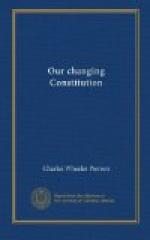The Constitution is a written instrument. As such its meaning does not alter. That which it meant when adopted it means now. Being a grant of powers to a government its language is general, and as changes come in social and political life it embraces in its grasp all new conditions which are within the scope of the powers in terms conferred. In other words, while the powers granted do not change, they apply from generation to generation to all things to which they are in their nature applicable. This in no manner abridges the fact of its changeless nature and meaning. Those things which are within its grants of power, as those grants were understood when made, are still within them, and those things not within them remain still excluded....
To determine the extent of the grants of power we must, therefore, place ourselves in the position of the men who framed and adopted the Constitution, and inquire what they must have understood to be the meaning and scope of those grants.
[Footnote 1: South Carolina v. United States, 199 U.S., 437.]
Thus speaks the voice whose word is law.
Viewed in the sense intended—as the formulation of a legal rule for the interpretation and construction of a written instrument—the statement compels assent. As a statement of historical and political fact, however, it would not be accepted so readily. An acute critic of our institutions has said that the Constitution “has changed in the spirit with which men regard it, and therefore in its own spirit."[1] Men realize that the words of the Constitution, like the words of Holy Writ, have not always meant the same thing to those who regulate their conduct by its precepts; that the system of government which those words embody has in reality changed, is changing to-day.
[Footnote 1: Bryce: “The American Commonwealth,” Vol. I, p. 400.]
The makers of the Constitution represented the people of distinct and independent states, jealous of their rights and of each other but nevertheless impelled by experience of danger lately past and sense of other perils impending to substitute for their loose and ill-working confederation a more effective union. The most formidable obstacle, apart from mutual jealousies, was a fear of loss of liberties, state and individual, through encroachment of the central power. The instrument, drawn with this fear uppermost, was designed to limit the National Government to “the irreducible minimum of functions absolutely needed for the national welfare."[1] To this end the powers granted were specifically enumerated. All other powers were by express enactment[2] “reserved to the States respectively, or to the people.”
[Footnote 1: Bryce, “The American Commonwealth,” Vol. I, p. 324.]
[Footnote 2: Tenth Amendment.]




